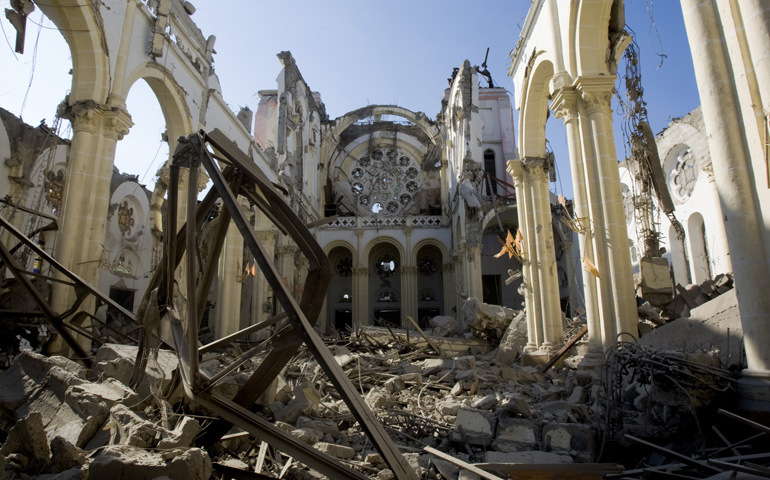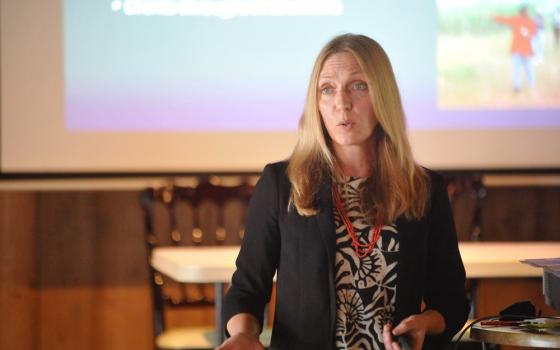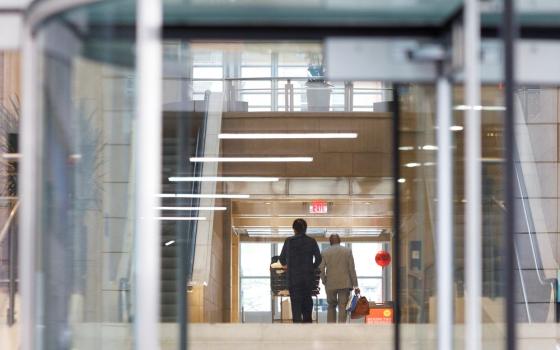
The remains of the Catholic cathedral of Port-au-Prince, Haiti, after the Jan. 12, 2010, earthquake that killed more than 200,000 people. (CNS/United Nations/Marco Dormino)
"I was at home with one of my sisters. She was watching television in the front room, and I was in back about to start on my homework. It was at that moment that the earth began to shake."
This is how Nerlande Janvier, a resident of Port-au-Prince, Haiti, remembers the earthquake that claimed the lives of more than 200,000 Haitians five years ago Monday.
"I didn't know what to do," she said. "All I could think of was the end of the world. I said to myself: That's it, this is how I'm going to die.
"I put my hands over my head, thinking that if the roof caved in, my hands would support it. I passed through the front room; my sister was already outside. She had gone out without even thinking of me. In a moment like that, you don't think of anyone else but yourself.
"I wept and wept while the aftershocks continued. I spent the night on the street, unable to close my eyes."
***
Other Haitians experienced the tragedy from afar. Jean-Dunique St. Germain was a university student in Paris when he received a phone call from another Haitian living in France, telling him to turn on the TV.
"The images were shocking," St. Germain said. "You immediately realized your impotence. A kind of yearning, or, even better, of righteous indignation rose up in me. I couldn't sleep or eat anything. I kept trying to get news of my family and friends who were over there ... impossible! The phone lines were terrible for days."
Jacky Merilan, a Redemptorist seminarian who will be ordained to the priesthood this summer, was in the novitiate in Chicago at the time and only got through to his brother in Haiti days after the quake.
"The first thing I could say was not 'Good morning,' but a person's name. I told my brother, 'You can answer yes or no to each person's name.' And if he said yes, I knew they were alive ... if he said no, I knew they were not. So I started with the immediate family and then branched out. I knew that at any time, communication could be interrupted, so I didn't pause; I just kept going down the list."
"After the quake," St. Germain told me, "I went to see what had happened with my own eyes. This was in 2011. In Port-au-Prince, you could see the aggressive effects of the quake -- its scale and its shock -- everywhere. Every face bore its mark, recalling the catastrophe. Sure, life has gone on, but what life? The situation is unlivable. So many of my neighbors haven't the basic necessities. They are forced to live in total self-abnegation."
***
Many reports after the quake suggested that for all the destruction, the Haitian people emerged with an even greater faith than ever. "The whole world was struck by the images in the newspapers of Haitians at prayer," St. Germain said. "The people I met and talked to in France could speak of nothing but 'the faith of the Haitians.' "
But both St. Germain and Merilan warned me that it is important not to generalize. However resilient a person's spiritual life may be, no one's is invincible.
"I think there are two dimensions here," Merilan said. "The first is the individual dimension. When someone is affected tremendously, there is a lot of uncertainty about where God is in the midst of it. People ask, 'Why did you allow this to happen to me?' I heard that a lot. You look at a family who had only one provider, and then that person, the head of the family, is gone -- what is left of them? Of course their faith will be shaken.
"The other part of this," Merilan went on, "is when you look at the whole. There are individuals who ask how God could allow this to happen, but when the whole country unites, there is a sense of togetherness, and they say, 'We are not just going to sit back in defeat.' This is Haitians in the plural, as a people in general."
St. Germain agreed that as a people, faith is one of the Haitians' characteristic traits. "They cling to it," he told me. "It is simply irreplaceable, even indestructible." But he too pushes the stereotype further.
"For me, as an atheist," he said, "I prefer to speak of a typically Haitian attitude or comportment: The Haitian is someone who understands himself and feels himself to be disadvantaged. Faith becomes a recourse, an escape, a bulwark; they have to cling to something, and God is there for them. They have nothing else. They've lost everything but their faith. So they've never pointed their fingers at God."
***
Again, Merilan adds a note of caution about generalizing. "Not everyone who clings to God does so because she has nothing," he said. "That is not true for me. People go to God not because they don't have anything but because they still have something, and they want to say thank you. They want to remain close to God so he can bless it."
Merilan said praying and studying the psalms, particularly their depictions of violence and loss, were helpful to him.
"We have the opportunity to start over, to re-center our lives around God. Not a God of vengeance -- because you know, we talk about the wrath of God, but that is just the way we analyze things because we expected God to let us keep everything forever. God is still a God of love because there is still a way to start over."
Merilan has noticed that the Sunday homily in Haiti has changed along these lines since the earthquake. "The preachers began to talk about hope, that there is something deeper. The earthquake was like Good Friday -- now we are waiting for Easter Sunday."
He recognizes that this will take time. "Five years later, people are still grieving, and it's no one's place to tell them, 'You have to deal with it this or that way.' No, that is not the pastoral need. You have to let their stories be heard."
***
The stories remain heart-wrenching. St. Germain is sober about the reality on the ground: "Still today, many people are swimming against the tide. They are, for the most part, eternal victims. The evil they endure has not yet turned to good."
Janvier said "strength, courage, and the desire to live" are key qualities of the Haitian people, yet when I asked her what signs of hope she sees around her, her assessment was also bleak.
"In my neighborhood, the houses that were destroyed are still not rebuilt for lack of resources. Seeing a nation slain; lives destroyed and whole families decimated; thousands and thousands of people buried under the rubble; lives broken off, futures erased; neighborhoods completely ruined, places once full of memories -- where can a person find hope after seeing something like that?"
The "true moment of sadness" for Janvier came four years after the quake, on Dec. 28, 2013, when armed robbers shot and killed her father in Port-au-Prince. He lived a few hours away, where he worked to earn money for the family, and had come home to celebrate the new year with them. "We didn't even have time to see him or talk to him before he was murdered," Janvier said.
"Sometimes I have spent days, even months, completely numb to God's existence, asking questions about God's existence," Janvier said. "And I am afraid I will be lost, saying things and doing things that aren't pleasing to our Lord."
***
There are many options if you wish to donate financially to Haiti's ongoing recovery. Catholic Relief Services is a top-rated charitable organization; you can specify that you would like your contribution to be used in Haiti on its donation page.



